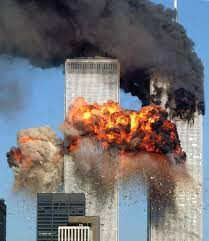9/11 Attacks: Ruins and Resilience
- FIC Hansraj

- Aug 18, 2021
- 3 min read
Updated: Aug 31, 2021
~ By Agrita Arora, Mansha Khanna, Lavina Garodia
9/11 is a date marked in black and red, one that is hard to forget, difficult to let go, and is inarguably the most horrific of all the events that human history has encountered. On a typical Tuesday morning, September 11, 2001, 8:45 a.m. changed the fate of people in unexpected ways, —home-ground terrorism in the U.S. and the resulting global terror to date.

Four planes were hijacked by 19 terrorists affiliated with the Islamic terrorist group Al-Qaeda and intended to cripple the U.S. economy by destroying three power centers: the World Trade Centre, the Pentagon, and the White House. United Airlines Flight 93 never made it to the White House while the first three planes reached their targets.
Here, one should keep in mind that the US economy was already hampered by the 2001 recession and only when it had started to grow in the fourth quarter, the 9/11 attacks took place accompanied by the damages cost amounting up to $55 billion (including values of the lives lost, economic dilapidations, etc).
Winding back to its catastrophic effects, it was the first time since the Great Depression that the stock market had closed for four trading days after attacks, and when it reopened, the Dow Jones Industrial Average (DJIA) had the highest one-day decline, dropping rapidly by 684.81 points or -7.1 percent. The S&P 500 Index also lost 11.6%, while the Nasdaq lost 16%. American Airlines and United Airlines share prices also decreased by 39% and 42% respectively following the tragedy. The four-day shutdown cost $1.4 billion alone.
Well, the less well-known fact is that while there was a short-lived blow to the stock markets, few other industries prospered from the attacks. They include, A.) Gold prices grew nearly 6% or $287 per ounce due to anxious investing. B.) When concerns arose that oil shipments from the Middle East would be curtailed, gas and oil prices also leapt. C.) A significant rise in their stock prices was seen by technology companies, communications and pharmaceutical firms, defense and weapons contractors, expecting a boost in government business as the nation prepared for the long crackdown on terror.

The US economy is known for its strength, resilience, and sustained optimism magnificently paved the road to recovery for the US after the 9/11 attacks. Rapid economic preparation conducted by the government and private institutions helped Americans get over the otherwise scheduled economic ramifications. These targeted improvements in unemployment services and monetary policy reform to assist small businesses had made the economy well-positioned in a short period of time to address the economic repercussions of the attack.
To recover its pre-9/11 price peaks, it took Dow Jones, the Nasdaq, and the S&P little more than a month. Even the price of oil that had spiked rapidly returned to its base levels. During the third quarter, the contraction of GDP indicated dragging the economy over the edge into an outright recession. A positive trend in the 4th quarter, however, reflected that it had recovered rapidly and any 9/11 impacts on demand were short-lived.
The Federal Reserve took all necessary steps to offer immediate liquidity to businesses and individuals to break the prospective domino chain of bankruptcies that could bring the financial system to a halt. Via the discount window, it provided funds to the bank, expanded credit to the economy through clearing checks, and generated almost 30 times the average float, which on Sept. 12 amounted to almost $23 billion. The available fluidity and the networks by which it was supplied became indistinguishable from pre-attack estimates within three weeks.
In addition to its huge impression on the US economy and the financial exchange, the attack has had a serious impact on the world's economies. The terror generated by the attacks on the US economy had contributed to a massive slump in almost all of the world's major emerging markets. With a staggering 8.5 percent fall in Germany, 4.6 percent in Spain, and 5.7 percent on the London stock exchange, the European stock indexes dropped sharply. In the Latin American exchanges, stocks had plummeted and pushed the emotions of the market-timer to a state of intense bullishness.
The events of 9/11 altered the world, ushering in a new age of fear and conflict. Less than a month after the attacks of September 11, the US and its allies began attacking Afghanistan, resulting in increased spending on homeland defense, with the expense of the war reaching $3 trillion. The 9/11 attacks are the death-dealing occurrence that would ever take place on the American planet, an act that we would never forget.







Comments